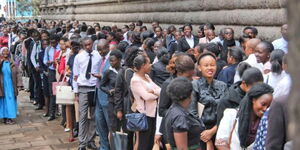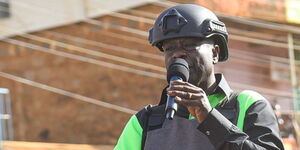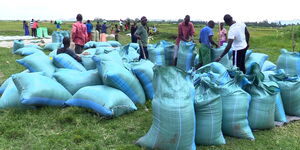The latest Stanbic Bank of Kenya Purchasing Managers' Index (PMI) report showed that employment in Kenya's private sector continued to grow fractionally in July despite challenges of political protests and economic instability.
This development comes amid a broader picture of economic struggle, with both output and new orders experiencing rapid declines.
"Despite the rapid declines in output and new orders during July, companies in Kenya continued to increase employment fractionally at the start of the third quarter. That said, the pace of job creation eased for the third consecutive month and was the weakest in the current seven-month sequence of rising staffing levels," the report indicated.
The PMI report, however, highlighted that the pace of job creation had slowed for the third consecutive month, marking the weakest growth in the current seven-month sequence of rising staffing levels.
The headline PMI dropped sharply to 43.1 in July from 47.2 in June, indicating a market deterioration in business conditions in the Kenyan private sector at the start of the third quarter. The report noted that this deterioration was the most severe since April 2021.
Christopher Legilisho, an economist at Standard Bank, stated that the July PMI was a fair representation of business activity during the month.
"Private sector business activity deteriorated, reflecting ongoing demonstrations and unrest in parts of Kenya for some weeks now, discouraging output and new orders. Business operations were disrupted, and customers delayed spending decisions due to the uncertainty," he explained.
The report said the protests, which caused significant disruptions, led to a reluctance among customers to commit to new orders while blocking access to businesses and preventing them from opening.
This resulted in steep reductions in both output and new orders.
The report also noted delays in completing outstanding business and receiving purchased items from suppliers.
Despite these disruptions, some positive signs emerged. For the seventh consecutive month, employment levels continued to rise, albeit fractionally.
This increase in staffing was driven by firms' attempts to address mounting backlogs exacerbated by the protests.
Staff costs in the Kenyan private sector also increased for the fourth successive month, though the rate of inflation slowed to the weakest in the current sequence of rising wages.
"The slight increase in input prices, purchase prices, staffing costs, and output prices reflects the higher cost of living and taxation," Legilisho added.
"However, output price increases in agriculture, services, and wholesale and retail trade were counterbalanced by declines in construction and manufacturing."
The report noted that business activity decreased across four of the five broad sectors covered, with agriculture experiencing the sharpest decline.
Manufacturing was the only category to post a rise in output.












